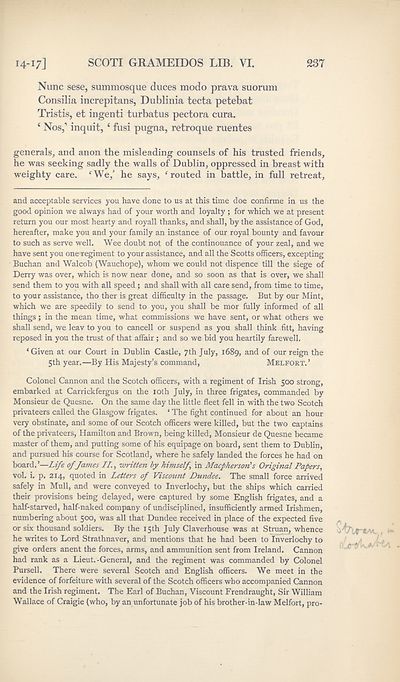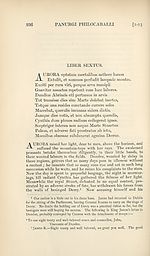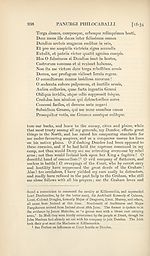Series 1 > Grameid: an heroic poem descriptive of the campaign of Viscount Dundee in 1689, and other pieces
(308) Page 237
Download files
Complete book:
Individual page:
Thumbnail gallery: Grid view | List view

14-17] SCOTI GRAMEIDOS LIB. VI. 237
Nunc sese, summosque duces modo prava suorum
Consilia increpitans, Dublinia tecta petebat
Tristis, et ingenti turbatus pectora cura.
‘ Nos,’ inquit, ‘ fusi pugna, retroque ruentes
generals, and anon the misleading counsels of his trusted friends,
he was seeking sadly the walls of Dublin, oppressed in breast with
weighty care. £We,’ he says, ‘routed in battle, in full retreat.
and acceptable services you have done to us at this time doe confirme in us the
good opinion we always had of your worth and loyalty ; for which we at present
return you our most hearty and royall thanks, and shall, by the assistance of God,
hereafter, make you and your family an instance of our royal bounty and favour
to such as serve well. Wee doubt not of the continouance of your zeal, and we
have sent you one regiment to your assistance, and all the Scotts officers, excepting
Buchan and Walcob (Wauchope), whom we could not dispence till the siege of
Derry was over, which is now near done, and so soon as that is over, we shall
send them to you with all speed ; and shall with all care send, from time to time,
to your assistance, tho ther is great difficulty in the passage. But by our Mint,
which we are speedily to send to you, you shall be mor fully informed of all
things; in the mean time, what commissions we have sent, or what others we
shall send, we leav to you to cancell or suspend as you shall think fitt, having
reposed in you the trust of that affair ; and so we bid you heartily farewell.
‘Given at our Court in Dublin Castle, 7th July, 1689, and of our reign the
5th year.—By His Majesty’s command, Melfort.’
Colonel Cannon and the Scotch officers, with a regiment of Irish 500 strong,
embarked at Carrickfergus on the 10th July, in three frigates, commanded by
Monsieur de Quesne. On the same day the little fleet fell in with the two Scotch
privateers called the Glasgow frigates. ‘ The fight continued for about an hour
very obstinate, and some of our Scotch officers were killed, but the two captains
of the privateers, Hamilton and Brown, being killed, Monsieur de Quesne became
master of them, and putting some of his equipage on board, sent them to Dublin,
and pursued his course for Scotland, where he safely landed the forces he had on
board.’—Life of James II., written by himself, in Macpherson's Original Papers,
vol. i. p. 214, quoted in Letters of Viscount Dundee. The small force arrived
safely in Mull, and were conveyed to Inverlochy, but the ships which carried
their provisions being delayed, were captured by some English frigates, and a
half-starved, half-naked company of undisciplined, insufficiently armed Irishmen,
numbering about 500, was all that Dundee received in place of the expected five
or six thousand soldiers. By the 15th July Claverhouse was at Struan, whence
he writes to Lord Strathnaver, and mentions that he had been to Inverlochy to
give orders anent the forces, arms, and ammunition sent from Ireland. Cannon
had rank as a Lieut.-General, and the regiment was commanded by Colonel
Pursell. There were several Scotch and English officers. We meet in the
evidence of forfeiture with several of the Scotch officers who accompanied Cannon
and the Irish regiment. The Earl of Buchan, Viscount Frendraught, Sir William
Wallace of Craigie (who, by an unfortunate job of his brother-in-law Melfort, pro-
Nunc sese, summosque duces modo prava suorum
Consilia increpitans, Dublinia tecta petebat
Tristis, et ingenti turbatus pectora cura.
‘ Nos,’ inquit, ‘ fusi pugna, retroque ruentes
generals, and anon the misleading counsels of his trusted friends,
he was seeking sadly the walls of Dublin, oppressed in breast with
weighty care. £We,’ he says, ‘routed in battle, in full retreat.
and acceptable services you have done to us at this time doe confirme in us the
good opinion we always had of your worth and loyalty ; for which we at present
return you our most hearty and royall thanks, and shall, by the assistance of God,
hereafter, make you and your family an instance of our royal bounty and favour
to such as serve well. Wee doubt not of the continouance of your zeal, and we
have sent you one regiment to your assistance, and all the Scotts officers, excepting
Buchan and Walcob (Wauchope), whom we could not dispence till the siege of
Derry was over, which is now near done, and so soon as that is over, we shall
send them to you with all speed ; and shall with all care send, from time to time,
to your assistance, tho ther is great difficulty in the passage. But by our Mint,
which we are speedily to send to you, you shall be mor fully informed of all
things; in the mean time, what commissions we have sent, or what others we
shall send, we leav to you to cancell or suspend as you shall think fitt, having
reposed in you the trust of that affair ; and so we bid you heartily farewell.
‘Given at our Court in Dublin Castle, 7th July, 1689, and of our reign the
5th year.—By His Majesty’s command, Melfort.’
Colonel Cannon and the Scotch officers, with a regiment of Irish 500 strong,
embarked at Carrickfergus on the 10th July, in three frigates, commanded by
Monsieur de Quesne. On the same day the little fleet fell in with the two Scotch
privateers called the Glasgow frigates. ‘ The fight continued for about an hour
very obstinate, and some of our Scotch officers were killed, but the two captains
of the privateers, Hamilton and Brown, being killed, Monsieur de Quesne became
master of them, and putting some of his equipage on board, sent them to Dublin,
and pursued his course for Scotland, where he safely landed the forces he had on
board.’—Life of James II., written by himself, in Macpherson's Original Papers,
vol. i. p. 214, quoted in Letters of Viscount Dundee. The small force arrived
safely in Mull, and were conveyed to Inverlochy, but the ships which carried
their provisions being delayed, were captured by some English frigates, and a
half-starved, half-naked company of undisciplined, insufficiently armed Irishmen,
numbering about 500, was all that Dundee received in place of the expected five
or six thousand soldiers. By the 15th July Claverhouse was at Struan, whence
he writes to Lord Strathnaver, and mentions that he had been to Inverlochy to
give orders anent the forces, arms, and ammunition sent from Ireland. Cannon
had rank as a Lieut.-General, and the regiment was commanded by Colonel
Pursell. There were several Scotch and English officers. We meet in the
evidence of forfeiture with several of the Scotch officers who accompanied Cannon
and the Irish regiment. The Earl of Buchan, Viscount Frendraught, Sir William
Wallace of Craigie (who, by an unfortunate job of his brother-in-law Melfort, pro-
Set display mode to:
![]() Universal Viewer |
Universal Viewer | ![]() Mirador |
Large image | Transcription
Mirador |
Large image | Transcription
Images and transcriptions on this page, including medium image downloads, may be used under the Creative Commons Attribution 4.0 International Licence unless otherwise stated. ![]()
| Scottish History Society volumes > Series 1 > Grameid: an heroic poem descriptive of the campaign of Viscount Dundee in 1689, and other pieces > (308) Page 237 |
|---|
| Permanent URL | https://digital.nls.uk/126599253 |
|---|
| Attribution and copyright: |
|
|---|
| Description | Over 180 volumes, published by the Scottish History Society, containing original sources on Scotland's history and people. With a wide range of subjects, the books collectively cover all periods from the 12th to 20th centuries, and reflect changing trends in Scottish history. Sources are accompanied by scholarly interpretation, references and bibliographies. Volumes are usually published annually, and more digitised volumes will be added as they become available. |
|---|


